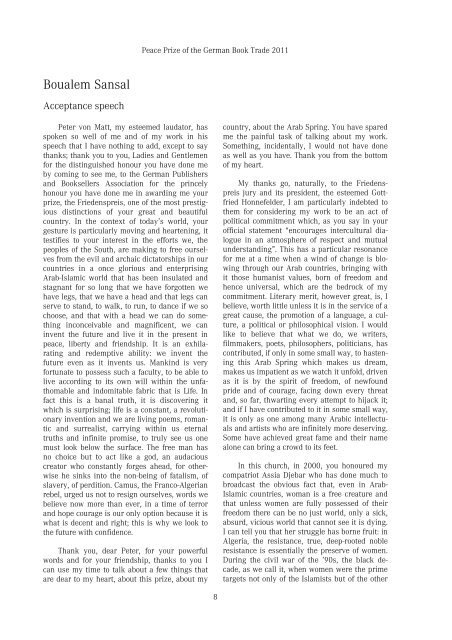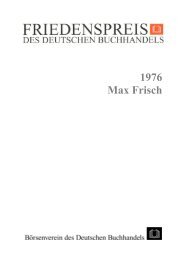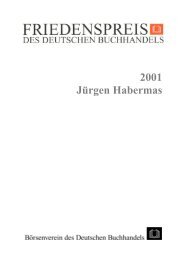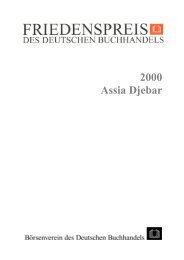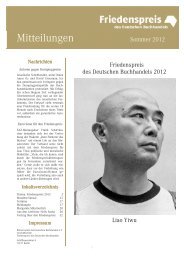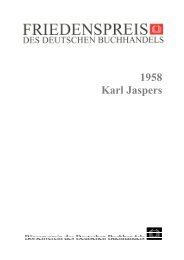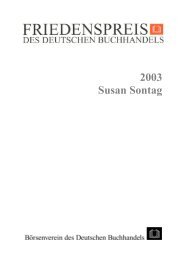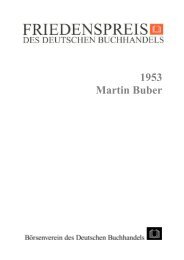2011 Peace Prize speeches - Friedenspreis des Deutschen ...
2011 Peace Prize speeches - Friedenspreis des Deutschen ...
2011 Peace Prize speeches - Friedenspreis des Deutschen ...
You also want an ePaper? Increase the reach of your titles
YUMPU automatically turns print PDFs into web optimized ePapers that Google loves.
Boualem Sansal<br />
Acceptance speech<br />
Peter von Matt, my esteemed laudator, has<br />
spoken so well of me and of my work in his<br />
speech that I have nothing to add, except to say<br />
thanks; thank you to you, Ladies and Gentlemen<br />
for the distinguished honour you have done me<br />
by coming to see me, to the German Publishers<br />
and Booksellers Association for the princely<br />
honour you have done me in awarding me your<br />
prize, the <strong>Friedenspreis</strong>, one of the most prestigious<br />
distinctions of your great and beautiful<br />
country. In the context of today’s world, your<br />
gesture is particularly moving and heartening, it<br />
testifies to your interest in the efforts we, the<br />
peoples of the South, are making to free ourselves<br />
from the evil and archaic dictatorships in our<br />
countries in a once glorious and enterprising<br />
Arab-Islamic world that has been insulated and<br />
stagnant for so long that we have forgotten we<br />
have legs, that we have a head and that legs can<br />
serve to stand, to walk, to run, to dance if we so<br />
choose, and that with a head we can do something<br />
inconceivable and magnificent, we can<br />
invent the future and live it in the present in<br />
peace, liberty and friendship. It is an exhilarating<br />
and redemptive ability: we invent the<br />
future even as it invents us. Mankind is very<br />
fortunate to possess such a faculty, to be able to<br />
live according to its own will within the unfathomable<br />
and indomitable fabric that is Life. In<br />
fact this is a banal truth, it is discovering it<br />
which is surprising; life is a constant, a revolutionary<br />
invention and we are living poems, romantic<br />
and surrealist, carrying within us eternal<br />
truths and infinite promise, to truly see us one<br />
must look below the surface. The free man has<br />
no choice but to act like a god, an audacious<br />
creator who constantly forges ahead, for otherwise<br />
he sinks into the non-being of fatalism, of<br />
slavery, of perdition. Camus, the Franco-Algerian<br />
rebel, urged us not to resign ourselves, words we<br />
believe now more than ever, in a time of terror<br />
and hope courage is our only option because it is<br />
what is decent and right; this is why we look to<br />
the future with confidence.<br />
Thank you, dear Peter, for your powerful<br />
words and for your friendship, thanks to you I<br />
can use my time to talk about a few things that<br />
are dear to my heart, about this prize, about my<br />
<strong>Peace</strong> <strong>Prize</strong> of the German Book Trade <strong>2011</strong><br />
8<br />
country, about the Arab Spring. You have spared<br />
me the painful task of talking about my work.<br />
Something, incidentally, I would not have done<br />
as well as you have. Thank you from the bottom<br />
of my heart.<br />
My thanks go, naturally, to the <strong>Friedenspreis</strong><br />
jury and its president, the esteemed Gottfried<br />
Honnefelder, I am particularly indebted to<br />
them for considering my work to be an act of<br />
political commitment which, as you say in your<br />
official statement “encourages intercultural dialogue<br />
in an atmosphere of respect and mutual<br />
understanding”. This has a particular resonance<br />
for me at a time when a wind of change is blowing<br />
through our Arab countries, bringing with<br />
it those humanist values, born of freedom and<br />
hence universal, which are the bedrock of my<br />
commitment. Literary merit, however great, is, I<br />
believe, worth little unless it is in the service of a<br />
great cause, the promotion of a language, a culture,<br />
a political or philosophical vision. I would<br />
like to believe that what we do, we writers,<br />
filmmakers, poets, philosophers, politicians, has<br />
contributed, if only in some small way, to hastening<br />
this Arab Spring which makes us dream,<br />
makes us impatient as we watch it unfold, driven<br />
as it is by the spirit of freedom, of newfound<br />
pride and of courage, facing down every threat<br />
and, so far, thwarting every attempt to hijack it;<br />
and if I have contributed to it in some small way,<br />
it is only as one among many Arabic intellectuals<br />
and artists who are infinitely more <strong>des</strong>erving.<br />
Some have achieved great fame and their name<br />
alone can bring a crowd to its feet.<br />
In this church, in 2000, you honoured my<br />
compatriot Assia Djebar who has done much to<br />
broadcast the obvious fact that, even in Arab-<br />
Islamic countries, woman is a free creature and<br />
that unless women are fully possessed of their<br />
freedom there can be no just world, only a sick,<br />
absurd, vicious world that cannot see it is dying.<br />
I can tell you that her struggle has borne fruit: in<br />
Algeria, the resistance, true, deep-rooted noble<br />
resistance is essentially the preserve of women.<br />
During the civil war of the ’90s, the black decade,<br />
as we call it, when women were the prime<br />
targets not only of the Islamists but of the other


